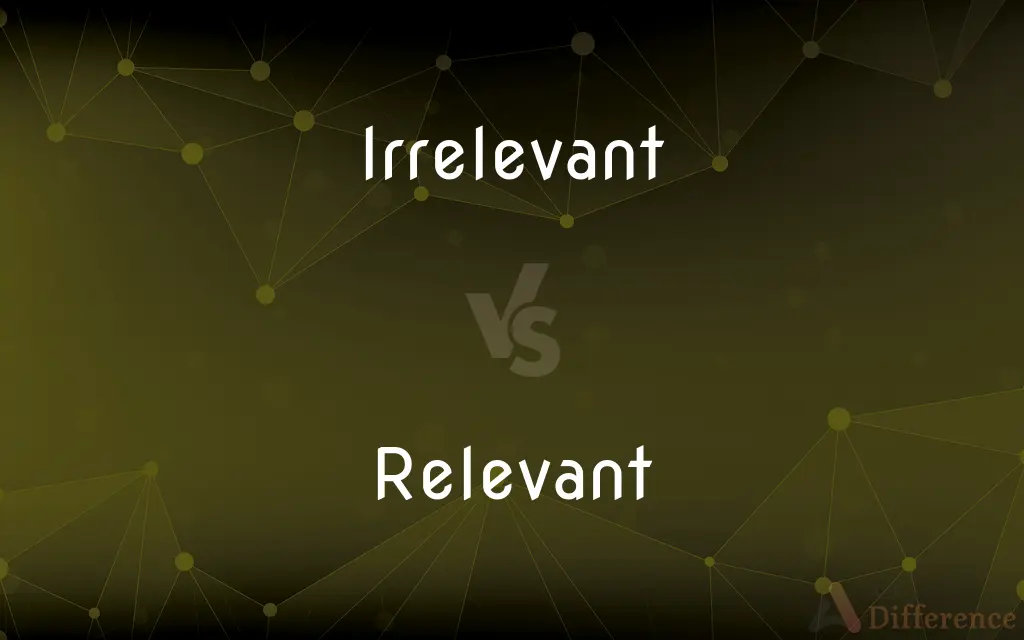Irrelevant vs. Relevant — What's the Difference?
By Tayyaba Rehman & Fiza Rafique — Updated on March 18, 2024
Irrelevant information does not apply to the matter at hand, while relevant information directly relates and contributes to the subject or problem.

Difference Between Irrelevant and Relevant
Table of Contents
ADVERTISEMENT
Key Differences
Irrelevant content lacks connection or significance to the current topic, often diverting attention or clouding judgment. On the other hand, relevant information is directly linked to the subject, providing necessary insight or evidence that aids in understanding or decision-making.
Irrelevant details may confuse or mislead, detracting from the main points or goals, whereas relevant details enhance comprehension, support arguments, and guide towards more informed conclusions.
In discussions or analyses, filtering out irrelevant data is crucial to maintain focus and efficiency, while identifying and leveraging relevant data is key to achieving objectives and gaining deeper insights.
Irrelevant information can be seen as noise in the communication process, diluting the message's impact, while relevant information strengthens the message, making it clearer and more persuasive.
While irrelevant elements are often disregarded or minimized in value, relevant elements are sought after, valued, and utilized for their significant contribution to the context or purpose at hand.
ADVERTISEMENT
Comparison Chart
Connection
Lacks direct connection to the subject
Directly linked to the subject
Contribution
Offers no useful contribution
Enhances understanding or decision-making
Impact
May confuse or mislead
Provides clarity and supports arguments
Importance in Communication
Seen as noise, diluting messages
Strengthens messages, making them persuasive
Value
Often disregarded or minimized
Highly valued and utilized
Compare with Definitions
Irrelevant
Off-topic.
Irrelevant comments during the meeting were quickly dismissed.
Relevant
Important.
His experience is particularly relevant to the job he's applying for.
Irrelevant
Unrelated.
They had to sift through irrelevant data to find the statistics they needed.
Relevant
Applicable.
The laws relevant to this case are quite clear.
Irrelevant
Not pertinent.
The professor advised students to avoid adding irrelevant information in their essays.
Relevant
Pertinent.
She made several relevant points during the discussion that swayed the team's opinion.
Irrelevant
Distracting.
Avoid irrelevant visuals in your presentation to maintain focus.
Relevant
Connected.
All research presented was highly relevant to the topic at hand.
Irrelevant
Inconsequential.
In the grand scheme of things, these details are completely irrelevant.
Relevant
Closely connected or appropriate to what is being done or considered
The candidate's experience is relevant to the job
What small companies need is relevant advice
Irrelevant
Not at all related: totally unrelated, wholly unconnected, completely inapplicable.
Relevant
Having a bearing on or connection with the matter at hand.
Irrelevant
Unrelated to the matter being considered.
Relevant
Meaningful or purposeful in current society or culture
Thought that the traditional male role of breadwinner was no longer relevant.
Irrelevant
Not relevant, as:
Relevant
Related, connected, or pertinent to a topic.
Irrelevant
Having no bearing on or connection with the subject at issue;
An irrelevant comment
Irrelevant allegations
Relevant
(Usually and especially) Directly related, connected, or pertinent, with important ramifications or implications.
His mother provided some relevant background information concerning his medical condition.
Irrelevant
Not usefully related: not associated in any way that is important or useful to the context being discussed: not materially applicable; having connections not applicable in the present situation.
Relevant
Not out of date; current.
Relevant
Relieving; lending aid or support.
Relevant
Bearing upon, or properly applying to, the case in hand; pertinent; applicable.
Close and relevant arguments have very little hold on the passions.
Relevant
Sufficient to support the cause.
Relevant
Having a bearing on or connection with the subject at issue;
The scientist corresponds with colleagues in order to learn about matters relevant to her own research
Relevant
Having crucial relevance;
Crucial to the case
Relevant testimony
Common Curiosities
How can one determine if a detail is irrelevant?
A detail is irrelevant if it does not contribute to the understanding, discussion, or resolution of a particular subject or problem.
What role does relevance play in research?
Relevance is key in research for focusing efforts on pertinent information and avoiding extraneous data that can mislead or distract.
In what ways can irrelevant information be harmful?
Irrelevant information can lead to confusion, poor decision-making, and wasted time and resources.
Why is it important to distinguish between irrelevant and relevant information?
Distinguishing helps focus on useful details, making discussions and decision-making more efficient and effective.
What makes information relevant?
Information is relevant if it directly relates to and assists in understanding or solving a specific issue or topic.
Can something be relevant in one context but irrelevant in another?
Yes, relevance is context-dependent; a piece of information can be crucial in one scenario and superfluous in another.
How does relevance affect communication?
Relevant information makes communication more effective by ensuring clarity and persuasiveness, whereas irrelevant information can dilute and confuse the message.
What is the role of relevance in education?
In education, relevance helps in curating content that directly contributes to learning objectives, enhancing student engagement and comprehension.
How do biases affect the perception of relevance?
Biases can lead individuals to overemphasize certain information as relevant while dismissing or overlooking other pertinent details.
Is relevance subjective?
While some aspects of relevance are objective, individual perspectives and needs can introduce a subjective element.
Can the relevance of information change over time?
Yes, as contexts and needs evolve, information that was once relevant can become irrelevant and vice versa.
How does technology assist in filtering relevant from irrelevant information?
Technology uses algorithms and filters based on keywords, context, and user behavior to highlight relevant information and minimize noise.
How can one improve their ability to identify relevant information?
Improving critical thinking skills and having a clear understanding of the objectives can help in better identifying relevant information.
Share Your Discovery

Previous Comparison
Sorel vs. Sorely
Next Comparison
Hatch vs. LatchAuthor Spotlight
Written by
Tayyaba RehmanTayyaba Rehman is a distinguished writer, currently serving as a primary contributor to askdifference.com. As a researcher in semantics and etymology, Tayyaba's passion for the complexity of languages and their distinctions has found a perfect home on the platform. Tayyaba delves into the intricacies of language, distinguishing between commonly confused words and phrases, thereby providing clarity for readers worldwide.
Co-written by
Fiza RafiqueFiza Rafique is a skilled content writer at AskDifference.com, where she meticulously refines and enhances written pieces. Drawing from her vast editorial expertise, Fiza ensures clarity, accuracy, and precision in every article. Passionate about language, she continually seeks to elevate the quality of content for readers worldwide.















































